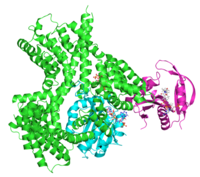
Photo from wikipedia
Abstract The bones form the framework of our body. We know that bones protect our vital organs, regulate calcium and phosphorous homeostasis, and function as a site of erythropoiesis. More… Click to show full abstract
Abstract The bones form the framework of our body. We know that bones protect our vital organs, regulate calcium and phosphorous homeostasis, and function as a site of erythropoiesis. More recently, however, the identification of bone hormones has allowed us to envision bones as endocrine organs too. Within the last few years, the bone hormones osteocalcin and lipocalin 2 have been implicated with glucose and energy metabolism. We systematically reviewed articles surrounding this subject and found a clear relationship between the osteocalcin levels and glucose tolerance and insulin sensitivity. We also found that many journals have shown the detrimental effects of an absences of lipocalin 2 from adipocytes. As osteocalcin administration to mice showed decreased blood glucose levels and promoted glucose tolerance and insulin sensitivity. Future studies could perhaps explore the use of osteocalcin as a supplement for type 2 diabetes.
Journal Title: Endocrine Regulations
Year Published: 2019
Link to full text (if available)
Share on Social Media: Sign Up to like & get
recommendations!